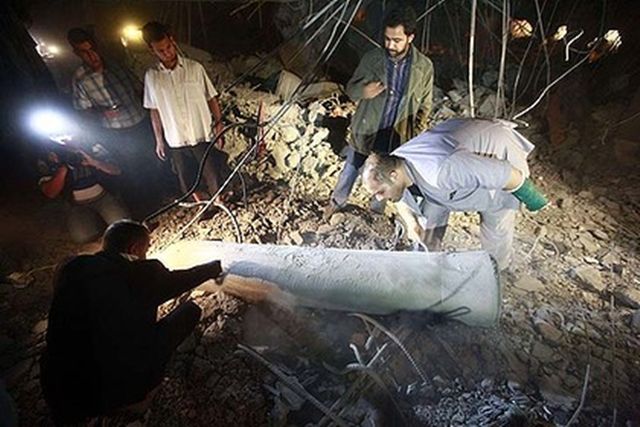
Moscow Strengthens Its Stance Against The Arab Revolutions
Publication: Eurasia Daily Monitor Volume: 8 Issue: 84
By:

The “No” vote in the UN Security Council on the draft resolution condemning the use of force against the civilian population in Syria marked a significant shift in Russia’s position towards the turmoil that has engulfed North Africa and the Middle East since the start of the year. For months, Moscow had vacillated with expressing concerns, but refrained from any affirmative action implicitly encouraging the US, France and Italy to take the lead in managing the unexpected crises. Now a new confidence has appeared in Russia’s stance, and it was confirmed in the vote against the resolution calling for an independent investigation of the situation in Syria adopted by the UN Human Rights Council, where Russia has no veto power but opted for joining the company of Cuba, Pakistan, and most significantly China (www.newsru.com, April 30; RIA Novosti, www.gazeta.ru, April 28).
Just one month ago, there seemed to be a serious difference between President Dmitry Medvedev and Prime Minister Vladimir Putin, as the latter criticized the Western “crusade” against Libya and the former pointedly rejected the use of such loaded terms (www.gazeta.ru, April 24). Two weeks ago, Medvedev expressed disapproval of the NATO operation that went beyond the limited aims of the UN Security Council Resolution 1973, which Russia and China let go by abstaining (Rossiyskaya Gazeta, April 15). These objections were dismissed by France and the US, who asserted that no new resolution was necessary and that Colonel Gaddafi was a legitimate target (Kommersant, April 27). Such affront was not well received in Moscow, and last week Putin in his trademark style lashed out against the air campaign arguing that he did not like it when “the so-called civilized community attacks a small country and destroys its infrastructure” (www.premier.gov.ru, Interfax, April 26, 27).
Libya certainly constitutes a particular case in the “arc of revolutions” that now stretches from Morocco to Iraq, and there is more to the Russian position than merely diplomatic maneuvering and the deepening estrangement between the two co-rulers. The very idea of a mass uprising against an established political order is seen as a threat to stability in Russia; hence Putin’s emotional defense of Gaddafi, who has built “a warped and ugly” monarchy, which nevertheless “on the whole satisfies the local mentality and political practice.” The argument about the abundance of monarchies in Africa is plainly ridiculous, but Putin clearly had a different matter in mind seeking to protect from external interference his own system of power whatever its ugly shortcomings (Ezhednevny Zhurnal, Ekho Moskvy, April 29). Russian mainstream media does not try to hide the scale of violence in Syria, but the hidden message in the official line of rejecting intervention is that any regime has the right to use necessary force to suppress unlawful rebellions.
This message refers not only to a hypothetical revolutionary situation in Moscow but also and more directly to the smoldering civil war in the North Caucasus. The explosion of revolutionary energy in Egypt coincided with the escalation of rebel attacks in Dagestan and Kabardino-Balkaria, which spilled over to Moscow when a suicide bomber hit the Domodedovo airport. The Russian leadership was anxious to contain this threat and imagined conspiracies growing in the turbulent Middle East and feeding the Islamic networks in the North Caucasus. In the last few weeks, however, several successful counter-terrorist operations have been performed targeting the leaders of rebel groups and thwarting new high-profile attacks (Kommersant, April 30).
Medvedev and Putin are thus reassured that terrorism would not upset their delicate decision-making on re-configuring the executive “vertical,” which has indeed grown warped. This newly-gained confidence contrasts sharply with the emerging perception that the West is not surfing on but rather struggling to contain the Arab revolutionary wave, and has stumbled into the civil war in Libya rather than jumped on the opportunity to execute a risk-free intervention. The suppositions informed by the “controlled chaos” theory that the US administration orchestrated President Mubarak’s pre-emptive dumping now look rather far-fetched despite supporting evidence on the destabilizing role of the Internet (Nezavisimoye Voyennoye Obozreniye, March 25). Far more convincing is the conclusion that the EU is concerned primarily about the new inflow of refugees from North Africa, and that the US is helpless to prevent the capture of political power in Egypt, and quite possibly in Libya, by the Muslim Brotherhood and its many off-springs (Moskovskiy Novosti, April 21).
This presumed confusion signifies the decline of Western influence in this geopolitically pivotal region whatever democratic agenda the ongoing revolutions might attempt to advance, and Russia intends to take advantage of this trend. Unlike Washington, Moscow seeks to demonstrate that it stands firm behind its allies, even such dubious ones as the Assad regime in Syria, and is not afraid to back the losing side, while also experimenting with mediation in the deadlocked conflicts. It has grave concerns about Islamic extremism but is convinced that the best way to address them is through expanded dialogue with political Islam, including, for that matter, Hamas, which is set to rejoin the Palestinian government (www.lenta.ru, April 28).
The course that combines a determined counter-revolutionary position, a pronounced disapproval of Western interference, and an attempt to befriend the rising Islamic forces is by no means straight, and Russia has few assets to work with. Instead of playing the role of an ambivalent but value-adding partner for the US, Moscow might find itself playing second fiddle to the Chinese diplomatic and economic offensive in the Middle East. This choice of partners, which also includes Turkey and might involve closer ties with Iran, is influenced not by opportunism, which is certainly a feature of Russia’s foreign policy, but by the nature of its regime. Putin has no doubt that the West would applaud his departure from the political arena (which is not in his plans), and Medvedev has good reasons to suspect that Western support for his modernization plans aims at a deep upgrade of the soft-authoritarian system of power, involving quite possibly easing him out. The Anti-Western attitude is therefore as organic to the entrenched Putinism as is counter-revolutionary zeal, and pragmatism is often over-ruled by their combined impact.




